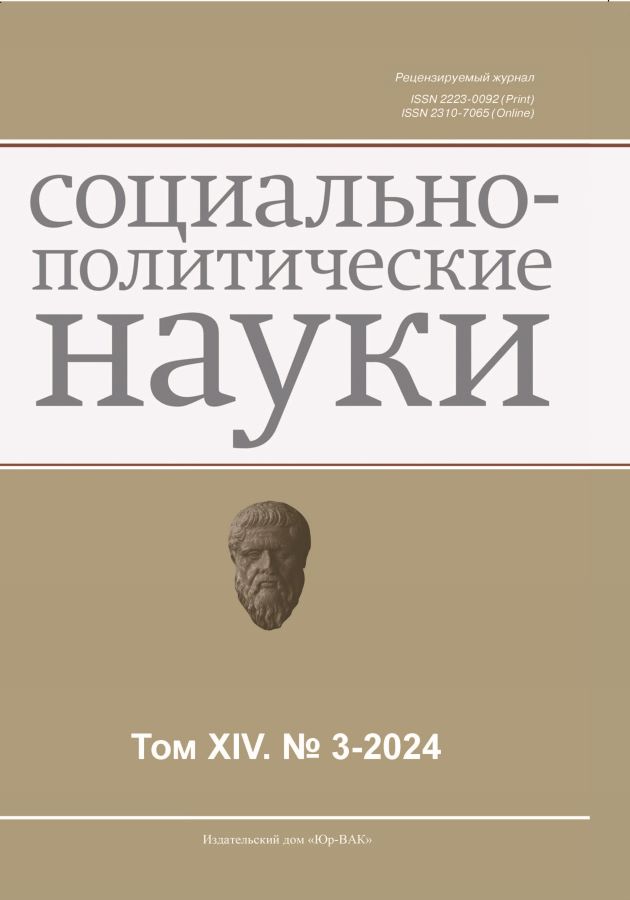Political aftertext in line with modern political practices
- Авторлар: Kravchenko V.V.1
-
Мекемелер:
- Zhirinovsky University of World Civilizations
- Шығарылым: Том 14, № 3 (2024)
- Беттер: 28-32
- Бөлім: Political Institutions, Processes and Technologies
- URL: https://journals.eco-vector.com/2223-0092/article/view/635459
- DOI: https://doi.org/10.33693/2223-0092-2024-14-3-28-32
- EDN: https://elibrary.ru/IGMLWS
- ID: 635459
Дәйексөз келтіру
Аннотация
The purpose of the research is to establish in modern political culture the concept of “zatext” and its various types in order to effectively resist provocations and disinformation of political opponents, apply adequate political technologies, achieving their political goals. The article suggests using the interdisciplinary term “zatext” to consider political strategies that are dynamically developing in the context of transforming international relations.
The results of the study show that the system of diplomatic and political discussions, statements and communications is currently changing dramatically: texts with a double bottom, essentially texts with overtones, are being replaced by direct speech, in which the accompanying overtones are immediately stated, clarifying the main theses without ambiguity and hints. Against the background of the unscrupulous use of fakes at various political levels by Western countries, Russian political leaders have chosen tactics and strategies of honesty, openness and direct debunking of unscrupulous machinations on the part of political opponents.
Conclusions. Thus, a new political trend is being formed – to create a new world order, which is based on equal interactions between Russia and all sincere and constructive allies. A new political culture is also emerging, based on universal human values, the desire for universal peace and the co-evolutionary development of world civilizations.
Негізгі сөздер
Толық мәтін
Авторлар туралы
Victoria Kravchenko
Zhirinovsky University of World Civilizations
Хат алмасуға жауапты Автор.
Email: vickra@mail.ru
ORCID iD: 0000-0002-4549-2489
SPIN-код: 1823-2410
Dr. Sci. (Philos.), Associate Professor; Professor, Department of World Politics and Intercivilizational Development
Ресей, MoscowӘдебиет тізімі
- Kiselyov S.G., Kefeli I.F., Opokin A.B. From behind the Iron Curtain in the hybrid war network (echo of Churchill’s Fulton speech). Eurasian Integration: Economics, Law, Politics. 2022. Vol. 16. No. 3 (41). Pp. 24–33. (In Rus.)
- Kolesnichenko Yu.V. The implicit substantiality of G.G. Shpet’s philosophy. Part 1. Bulletin Moscow State Regional University. Series: Philosophy of Science. 2017. No. 3. Pp. 72–80. (In Rus.)
- Kutepov V.A., Rybakov S.V. Churchill’s Fulton speech: the essence and subtexts. Omsk Scientific Bulletin. 2013. No. 3 (119). Pp. 17–20. (In Rus.)
- Falin V.M. About the connection of times and the interconnection of ideas. Word. 2012. December 14–27. No. 47–48. Pp. 4–5. (In Rus.)
- The phenomenon of zatext: Monograph. T.A. Snigireva, A.V. Podobenova (gen. eds.). Yekaterinburg: Publishing House of Ural University, 2021. 392 p.
- Huntington S. Clash of Civilizations. Moscow: AST, 2003. 603 p.
Қосымша файлдар








